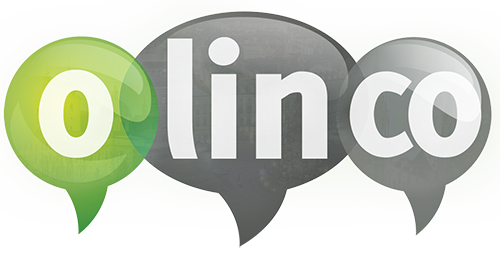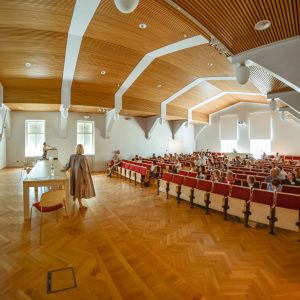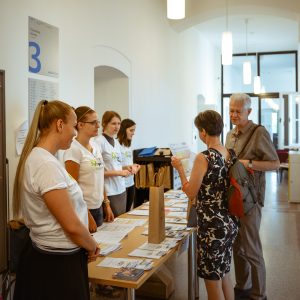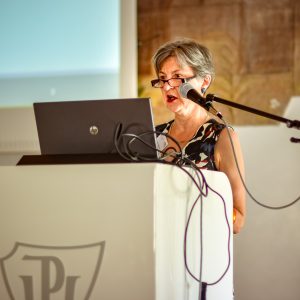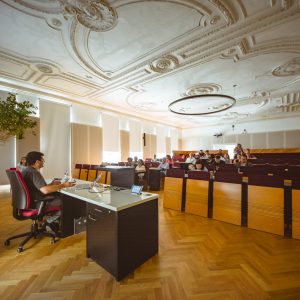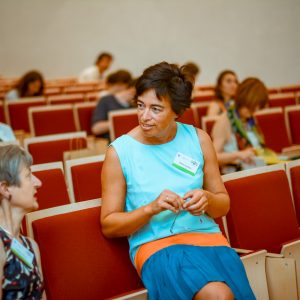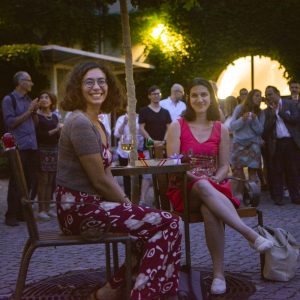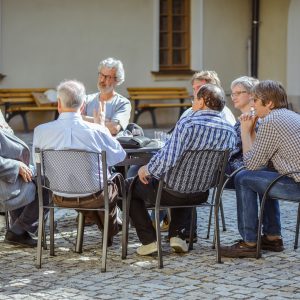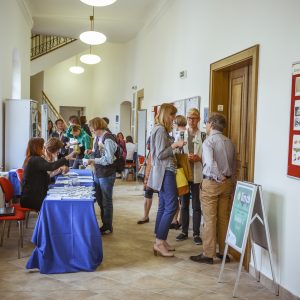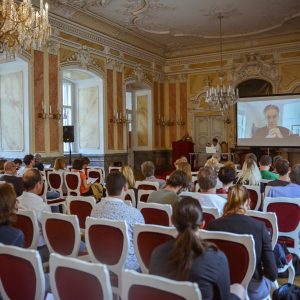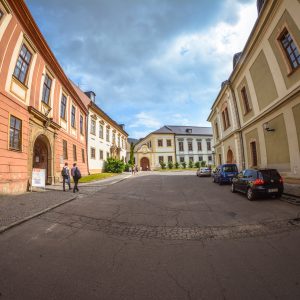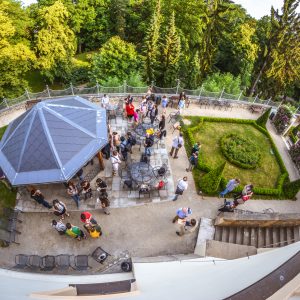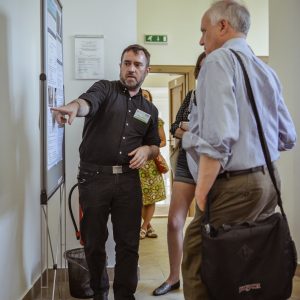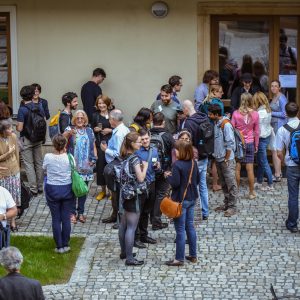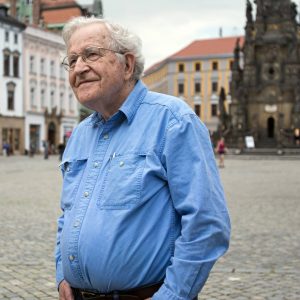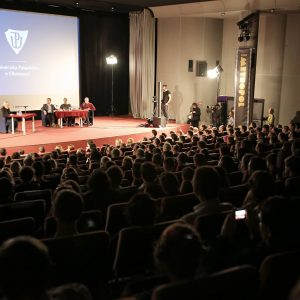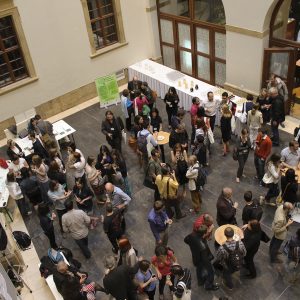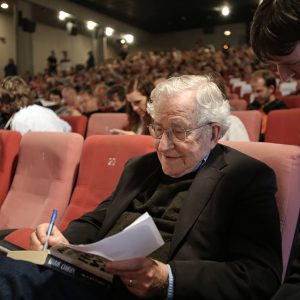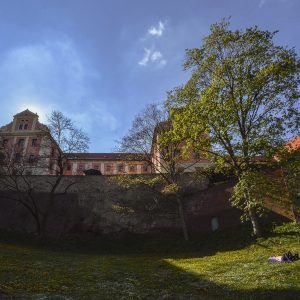The Olomouc Linguistics Colloquium (Olinco) is a general linguistics conference held biannually at Palacký University Olomouc, Czech Republic. It covers synchronic or diachronic aspects of grammar, phonology, semantics, and pragmatics, among others. Papers may also treat language description, language acquisition, performance, translation, or language deficits.
The general topic of the conference is language use and linguistic structure. The contributions are expected to include justified proposals for linguistic structure, and at the same time relate these structures to some aspect of language use, such as information structure, phonetics, or meaning. The conference also includes several specialized thematic sessions.
Invited speakers
Kateřina Chládková
(Czech Academy of Sciences & Charles University in Prague)
Language Learning Beginnings
Most people come to be language learning beginners at least twice in their lifetime: once rather early when they acquire their native language, and then again, at a somewhat later age when they start to learn a second language. While the development of the first and second language seem to be dramatically different processes, one can as well identify similarities between them. In this talk, I will focus on the initial stages of first and second language
acquisition and present a series of experiments with infants and adults that targeted the early stages of native and non-native language development. Based on data from speakers and listeners with various language backgrounds and in various learning scenarios, I will argue that second-language adult learners have access to at least some of the learning mechanisms that were active during their first-language development in infancy. The findings will be
discussed in light of influential models of language development.
Marcel den Dikken
(Hungarian Research Centre for Linguistics &
Eötvös Loránd University, Budapest, Hungary)
P, alternatively — On adpositions, their distribution, and their license for silence
Building in part on previous work (some of it done in collaboration with Éva Dékány) and in part on new material, this paper presents an integral perspective on the circumstances determining the distribution of adpositions in syntax and phonology, with particular emphasis on (a) the status of individual tokens of adpositions as heads of lexical PPs or of functional projections, and (b) the conditions under which the head of a syntactically projected PP can remain silent. On the agenda for discussion are (i) argument-structure alternations in which one member features an overt P and the other does not (the conative alternation, the dative/applicative alternation), (ii) prepositions as copular mediators of predication relationships in syntax, and (iii) the link between P and case, and the principled distribution of autonomous and alternative realization of P (in the sense of Emonds’ work).
Ekkehard König
(Freie Universität Berlin)
On the historical development of asymmetries: The case of directional demonstratives in Germanic
The structuring and encoding of motion events through language, the shape of the linguistic inventories found in individual languages, as well as the symmetries and asymmetries manifested by such systems have received a great deal of attention during the last four decades. The vast majority of the relevant studies adopted a purely synchronic perspective and diachronic studies of the relevant phenomena, such as Luraghi, Nikitina & Zanchi (2017), are rare exceptions. The aim of this paper is to make a contribution to this discussion by analyzing in detail one type of directional expression in one language family,
viz. directional demonstratives in Germanic languages, the structure of the relevant systems at different stages of individual languages, the reduction and loss of oppositions and the resultant creation of striking asymmetries. The results of the descriptive part will be examined and evaluated from a comparative and typological perspective.
Important dates and info
Abstract submission deadline: 31 January 2023
Notification of acceptance: 1 March 2023
Registration and revised abstract submission deadline: 5 May 2023
Conference: 8 – 10 June 2023
Papers and posters
We welcome proposals for full oral presentations and short presentations (posters) in the form of abstracts related to the general topic and/or a workshop topic. Abstract submission guidelines are given below. The language of the conference is English. All abstract submissions will be anonymously reviewed by an international committee of linguists.
Participants are allowed to present only one single-authored paper. In addition, they may also have joint papers (but not as the first author, and the paper must be presented by another author). All papers will be presented on-site.
Thematic sessions
Details below.
– The grammar of results
Convenor: Éva Kardos (University of Debrecen, Hungary)
– Deictics and Demonstratives: Comparative and Empirical Approaches
Convenor: Volker Gast (Friedrich Schiller University Jena)
– Empirical methods in linguistics
Convenor: Radek Šimík (Charles University in Prague)
I. PROPOSALS: Abstracts of oral presentations and posters (short presentations) need to comply with the following guidelines:
Anonymity. Abstracts must be anonymous. References to one’s own work should be made in the third person. (Please make sure that you do not include your name in the document properties.)
Length. The text of the abstract should contain between 400 and 500 words (one page maximum). Bibliography and tables or figures may be submitted on a second page.
Structure. It is important that the abstracts clearly state research questions, approach, method, data, and (expected) results.
Acceptable file format. The abstract should be submitted as a PDF file. Please make sure that all fonts are embedded in the file. If your abstract is accepted, you will be asked to supply a revised version for inclusion in a book of abstracts (for the templates, see below).
Multiple authorship. Please note that participants are allowed to present only one single-authored paper. In addition, they may also have joint papers (but not as the first author).
Session selection. During the submission process, you will be asked to indicate whether you want your proposal to be included in one of the thematic sessions or in the main conference session.
Submission. Abstract are submitted via EasyChair. Deadline: see above.
II. REVISED abstracts (following notification of acceptance)
Format of the REVISED abstract. Please use the prepared template (.docx) for the revised abstract, or follow the instructions in the pdf file:
Olinco revised abstract template (MS Word)
Olinco revised abstract template (.pdf)
The revised abstract must be written in Times New Roman 11 point font, with 2.5 cm margins on all sides, 1.15 spacing. The revised abstract must include the authors’ names, affiliations, and email addresses in the heading, which is in Times New Roman 12 (see the template above for details). Do not insert page numbers.
Length of the revised abstract. The text of the revised abstract should be two pages long maximum (including references and figures).
Acceptable file format of the revised abstract. The revised abstract should be submitted as a PDF file . Please make sure that all fonts are embedded in the file.
To be submitted by 5 May 2023 via the submission link.
Organizing committee
Current members of the Olinco organizing committee at Palacký University Olomouc:
Joseph Emonds
Ludmila Veselovská
Michaela Martinková
Šárka Šimáčková
Václav Jonáš Podlipský
Markéta Janebová
Michaela Čakányová
Board of reviewers
The organizing board is very grateful to all distinguished colleagues who contribute to the conference by reviewing submitted abstracts.
Their full list is here (.pdf)
Registration will open after the notifications of acceptance in March 2023.
Registration deadline: 5 May 2023
Fees:
- €90 (including conference dinner, welcome reception and coffee breaks)
- discount for Palacký University participants
The grammar of results
Convenor: Éva Kardos (University of Debrecen, Hungary)
In this workshop we would like to explore the syntax and semantics of result-denoting elements such as verbal particles, prefixes and resultative secondary predicates across languages. We invite submissions addressing, but not limited to, the following questions:
1. What kind of constraints characterize the number and type of results that can be expressed in a single clause? This question can, for example, be addressed in the context of Slavic prefixes and English expressions such as knock someone unconscious to the ground and knock someone down dead. According to Ausensi and Bigolin (2021), these English examples illustrate structures with a low depictive and a result state complement and so do not pose a challenge for the Unique Path Constraint (Tenny 1987, 1994, Goldberg 1991) on the condition that it is understood as a syntactic constraint. As for Slavic prefixes, it has been proposed by a number of scholars that they fall into two (or three) classes based on their (in)ability to stack and their position before the verb (and some other diagnostics) (Svenonius 2004, Tatevosov 2008). For instance, lexical prefixes have been argued to be unable to stack and occupy a VP-internal position, whereas superlexical prefixes can stack and are often assumed to sit further away from the verbal root in a VP-external position (Svenonius 2004). Recently, however, Marušič et al. (2022) have carried out a corpus analysis of prefixes in Slovenian and found that a small set of prefixes do appear in stacking environments (see, for example, vz-peti ‘climb’ vs. po-vz-peti ‘climb’ and po-staviti ‘put/stand’ and vz-po-staviti ‘establish’) in spite of the fact that they express idiosyncratic or spatial meanings, typical of lexical prefixes. They propose based on Žaucer (2013) that they should be analyzed as result and result-modifying prefixes and so again argue against the hypothesis that two results of the same type appear within the VP. It would be interesting to examine whether such structures are also available in other (Slavic) languages and, if so, how it is best to represent their syntax and semantics. If, by contrast, they are not available, it would be good to see what alternative strategies languages use to express what the Slovenian doubly prefixed verbs like those above do.
2. What kind of semantics characterizes result-denoting elements across languages? English-type verbal particles like up in eat up and resultative secondary predicates seem to just express result states, whereas result-denoting verbal particles like meg in Hungarian have been shown to be also associated with event quantification (Halm 2015, Kardos 2016). Some Slavic prefixes have also been argued to encode event quantification, but they are also known to have adverbial meanings rather than resultative ones (see Svenonius’s (2004) superlexical prefixes). We would like to see if resultative elements in other languages have a quantificational effect on events and whether this has any consequences for their structural representation.
3. What is the relationship between the expression of results and telicity? In English it has been argued that these notions are independent of each other (Rappaport Hovav and Levin 2010) as many result verbs such as cool and warm are not lexically telic and “some instances of telicity cannot be analyzed in terms of a result state” (ibid. 27) (see, for example, telic read a book), whereas in languages like Hungarian a morphologically complex result verb is often necessary for telic interpretations (contextual cues do not generally play a role in telicity) and so the two notions can more easily be equated here. It would be useful to look into other languages, as well, and see how it is best to model the relationship that holds between these notions.
– Deictics and Demonstratives: Comparative and Empirical Approaches
Convenor: Volker Gast (Friedrich Schiller University Jena)
The workshop entitled „Deictics and Demonstratives: Comparative and Empirical Approaches“, aims to bring together findings from comparative linguistics, typology, cognitive linguistics and other sciences. This workshop aims to bring together the latest findings on demonstratives (expressions used for spatial and temporal orientation from the perspective of the speaker or other participants in the interaction). Special attention will be paid to the multimodality of these expressions (linking them with gestures and other non-verbal means), which requires interdisciplinary links with other sciences, such as psychology.
Click here for the Conference programme and the Book of abstracts.
Oral presentations (on-site only)
Each paper in an oral session will be allotted 40 minutes, including 5 – 10 minutes for discussion, i.e. the talk should last no more than 30 – 35 minutes.
The language of the presentation is English. Non-English examples should be properly glossed and translated to English.
Available technology: We will provide a PC with Microsoft Office and Adobe Reader connected to a dataprojector and speakers. We strongly advise you to bring your presentation on a USB flash drive because we cannot guarantee your laptop will be compatible with our on-site equipment (especially applies to Mac users). Presenters will have 10 minutes before the beginning of every oral session to check their presentations on the equipment. A technical assistant will be present to help.
Poster presentations (on-site only)
The language of the presentation is English. Non-English examples should be properly glossed and translated to English.
Posting: Authors of posters are required to be present during their poster session to discuss their posters with interested conference-goers.
Authors should attach their posters to the boards before the beginning of the session (materials for attaching will be provided).
Posters should be removed from the boards by their presenters before the next poster session begins or in the evening following the presentation. Posters left on the boards will be removed by the organizers and can be collected at the registration desk.
Format: The poster boards are in the portrait orientation, their size is ISO A1 format (594 mm width, 841 mm height). The main text should be in a large enough font (e.g. 32 pts). The text should be brief and presented in bullet-point or numbered lists as much as possible. Avoid long paragraphs.
We recommend that poster presenters prepare reduced-size copies of their posters (e.g. A4 sheets) to be handed out.
Conference venue: Palacký University Olomouc, Faculty of Arts, Department of English and American Studies
Address: Křížkovského 10, Olomouc, 771 80
The 2025 Olomouc Linguistics Colloquium (Olinco 2025) will be held in the recently restored Palacký University Faculty of Arts.
This building which served for hundreds of years as a college related to the Moravian archbishopric is centrally located among other historic buildings atop the city walls. It overlooks a verdant park that separates the conference venue and the dormitory accommodations.
Both the conference venue and the accommodations are easily accessible by tram lines. Visit practical information for more.
Travel
Coming by air: The closest airports are in Ostrava (2 hours by bus and train), Brno (2 hours), Prague (3.5 hours), Bratislava (4 hours), Katowice (4 hours) and Vienna (4.5 hours).
From Prague airport to Prague main train station: The easiest way to get from Václav Havel Airport Prague to the main train station (Praha, hlavní nádraží, sometimes abbreviated to Praha, hl. n.) is to take the Airport Express (AE) bus. It stops right in front of the arrival hall (a bit to the right, the last bus stop) and takes you directly to the main train station, which is the terminus. When travelling from the airport, the Airport Express bus tickets may be purchased in the Visitor Centre at Arrival Hall or directly from the driver. You buy the ticket from the driver for CZK 60 (about EUR 2.5, but the driver does not accept foreign currencies, so you have to exchange money at the airport, try to have a 200 crown note or less). The ticket machines at the stop do not sell this ticket. More info here.
Alternatively, take bus 119 and then change for the metro (you can get the CZK 40 ticket from the ticket machine or pay by card in the bus).
Coming by train: Olomouc is easily reached by express trains (2.5 hours from Prague, 3.5 hours form Vienna, 3 hours from Katowice). Online connection search. Online map of train delays (in Czech).
There are three major railway companies (Czech Railways, RegioJet, and Leo Express). With RegioJet and Leo Express, you book a specific connection, and the ticket cannot be used for any other train. With Czech Railways, you can book a specific train or an open ticket (only usable on that day for a Czech Railways train).
General information about Olomouc including details on public transportation.
Palacký University Olomouc, Faculty of Arts
Address: Křížkovského 12, Olomouc, 771 80
Web: http://www.ff.upol.cz/en/
Lunch break tips:
Restaurants close to the venue & other tips
Accommodation:
Palacký University dormitories
Tips on accommodation in the vicinity of the conference venue (all of these are included at Booking.com):
Hotel U Dómu (300 meters to venue)
Address: Dómská 4, Olomouc 77200
Tel.: +420 724 335 609
E-mail: hoteludomu@seznam.cz
Miss Sophie’s Hotel (350 meters to venue)
Address: Denisova 292/33
Tel.:+ 420 587 203 509
Email: olomouc@miss-sophies.com
Long Story Short (350 meters to venue)
Address: Koželužská 945/31
Tel.: +420 588 008 278, +420 606 090 469
Email: reception@longstoryshort.cz
Hotel Palác (400 meters to venue)
Address: 1. Máje 869/27
Tel.: +420 585 242 175
Email: info@hotelpalac.cz
OREA Hotel Arigone (450 meters to venue)
Address: Univerzitní 20, 779 00
Tel.: +420 585 232 351
Email: recepce.arigone@orea.cz
Hotel V Ráji (500 meters to venue)
Address: Hanáckého pluku 10, Olomouc, 779 00
Tel.: +420 739 052 417
Hotel Pension Na Hradě (700 meters to venue)
Address: Michalská 4, Olomouc, 779 00
Tel.: +420 585 203 231
Fax: +420 585 203 232
Email: penzion@penzionnahrade.cz
Penzion Na Hradbách (800 meters to venue)
Address: Hrnčířská 3, Olomouc 772 00
Tel.: +420 585 233 243, +420 602 755 848
E-mail: rezervace@nhpension.eu
Hotel Trinity (900 meters to venue)
Address: Pavelčákova 22
Tel.: +420 581 830 811
Email: reception@hotel-trinity.cz
Pension Křivá (1100 meters to venue)
Address: Křivá 8, Olomouc, 772 00
Tel.: +420 585 209 204
E-mail: info@pension-kriva.cz
Money
The Czech koruna (CZK or Kč) is the official currency in the Czech Republic. The approximate exchange rate is ca 25.15 CZK to a Euro and 25.8 CZK to a US Dollar. Exchange rates for all major currencies are available here.
Electricity
Czech sockets are standard European sockets CEE 7/5, with a voltage of 230 V/50Hz. All visitors coming from countries using appliances/plugs that do not work with such sockets/voltages (e.g. USA, UK) are advised to bring adapters.
Mobile phones
Czech mobile phone operators use both of the two standard European GSM bands, 1800 and 900 MHz. All European mobile phones will work without problems but visitors from the US may need a tri-band phone. The country calling code for the Czech Republic is +420.
Weather
Czech Republic has a temperate continental climate, with temperatures averaging 17°C during the day in early June. Worst comes to worst, a raincoat or an umbrella may be of some use. Current forecast is available here.
Submission process:
Papers are written in English. All contributions must be original and previously unpublished, not currently submitted for publication elsewhere.
Please see the Olinco2023_stylesheet for information regarding the proper formatting of your manuscript and citation norm.
All contributions submitted to the Olinco proceedings will be considered and reviewed anonymously by at least two reviewers (the peer-reviewing process is single-blind, with at least one of the reviewers external to Palacký University Olomouc). The reviewing process is usually completed within two months.
The proceedings will be published online in the year following the Olinco conference year.
Please submit electronically as e-mail attachments (in Word .doc or .docx files) to the editors (olinco@upol.cz).
Olomouc Linguistics Colloquium proceedings (previous volumes):
Olinco 2023: Selected papers were included in a peer-reviewed volume of conference proceedings (available here).
Olinco 2021: Selected papers presented at the Olomouc Linguistics Colloquium 2021 were included in a peer-reviewed volume of conference proceedings entitled Language Use and Linguistic Structure. Proceedings of the Olomouc Linguistics Colloquium 2021.
Olinco 2018: Selected papers that were presented at the Olomouc Linguistics Colloquium 2018 have been included in a peer-reviewed volume entitled Proceedings of the Olomouc Linguistics Colloquium 2018 (included in the Web of Science™).
Olinco 2016: The book of Proceedings of the Olomouc Linguistics Colloquium 2016 is available here (.pdf).
Olinco 2014: The electronic version of the Olinco 2014 proceedings, entitled Complex Visibles Out There, can be downloaded here (.pdf). The volume is a part of the Olomouc Modern Language Series.
Olinco 2013: Selected papers presented at the Olomouc Linguistics Colloquium 2013 are included in the proceedings entitled Language Use and Linguistic Structure (.pdf) and in a separate themed monograph entitled Nominal Structures: All in Complex DPs (.pdf). Both books have been included in the Web of Science™.
If you have any questions, do not hesitate to contact us at olinco@upol.cz.
Previous Olinco conferences:
Olinco 2013:
Book of abstracts (.pdf)
Conference proceedings (.pdf)
Monograph (.pdf)
Olinco 2014:
Book of abstracts (.pdf)
Conference proceedings (.pdf)
Olinco 2016:
Conference proceedings
photo gallery
Olinco 2018:
Book of Abstracts
Proceedings
Conference website
Olinco 2023:
Book of abstracts (.pdf)
Conference programme (.pdf)
Conference proceedings (.pdf)
